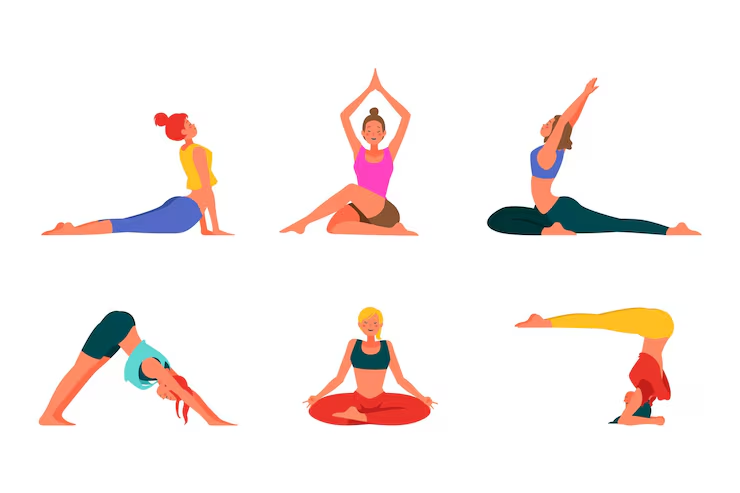1. Deep Breathing
“Reset Your Nervous System in Under a Minute”
Deep breathing is one of the quickest and most effective ways to calm your body’s stress response. Here’s how to practice it:
- Sit or lie down in a comfortable position.
- Inhale deeply through your nose to a count of 4.
- Hold your breath for a count of 4.
- Exhale slowly through your mouth to a count of 6.
- Repeat this process for 5 to 10 minutes.
This technique activates the parasympathetic nervous system, helping to reduce cortisol (the stress hormone) and lower your heart rate.
Bonus Tip: Try apps like “Calm” or “Pranayama” for guided breathing exercises.
2. Mindfulness Meditation
“Train your mind to live in the present”
Mindfulness is the practice of paying attention to the current moment without judgment. Research shows that regular mindfulness practice can significantly reduce anxiety and improve focus.
Here’s a simple mindfulness meditation exercise:
- Set a timer for 10 minutes.
- Find a quiet place to sit and focus on your breath.
- When your mind starts to wander (which it will), gently redirect your attention back to your breath.

3. Exercise and Movement
Move Your Body, Free Your Mind
Engaging in physical activity releases endorphins, which are natural mood lifters. Additionally, it helps lower levels of adrenaline and cortisol.
Effective forms of movement include:
- Brisk walking or jogging for at least 30 minutes a day
- Yoga for mind-body awareness
- Dance or aerobic classes
- Strength training at least twice a week
Note: Even short 10-minute walks can improve mood and significantly reduce stress.

4. Journaling
Write to Release and Reflect
Writing down your thoughts is a powerful way to relieve emotional tension. Here are some types of journaling you might consider:
- Gratitude Journal: List three things you’re thankful for each day.
- Emotional Release Journal: Vent your feelings without any filters.
- Problem-Solving Journal: Outline your stressors and brainstorm possible solutions.
Engaging in these journaling practices can help externalize your stress, making it easier to understand and manage.
5. Time Management
Don’t manage time – master it
A cluttered schedule can lead to a cluttered mind. By managing your time effectively, you can often reduce stress automatically.
Here are some strategies to implement:
- Use the Eisenhower Matrix to prioritize tasks based on urgency and importance.
- Time block your day, making sure to include breaks for better productivity.
- Learn to say “NO” more often. Setting boundaries is essential for maintaining mental health.
Recommended Tools: “Google Calendar” or “Notion” can help you with planning and tracking your tasks.
6. Social Connection
Talk It Out, Don’t Tough It Out
Connecting with others is a great way to reduce stress. When we’re isolated, stress can feel even worse, but having support from friends and family helps.
Here are some ways to stay connected:
- Call or visit friends and family regularly.
- Join interest-based groups, whether online or in person.
- Don’t hesitate to seek emotional support from loved ones or a therapist.
Even a heartfelt conversation lasting just 10 minutes can release oxytocin, which helps reduce stress and build trust.

7. Limit Stimulants and Screen Time
Reduce what overwhelms your senses
Caffeine, sugar, and excessive screen time – especially on social media – can overwhelm your nervous system. Here are some tips to help you manage this overstimulation:
- Replace one cup of coffee with green tea or plain water.
- Activate “DND” mode after 9 PM.
- Avoid scrolling through social media in bed – try reading a book or meditating instead.
- Be aware that blue light and constant comparison can significantly disrupt your sleep and mental well-being.
8. Sleep Hygiene
Repair Through Deep Rest
Poor sleep can both contribute to and be a symptom of stress. To prioritize quality sleep, consider the following sleep hygiene checklist:
- Go to bed and wake up at the same time every day.
- Keep your bedroom cool, dark, and quiet.
- Avoid screens for one hour before bedtime.
- Try herbal teas such as chamomile or ashwagandha.
Aim for 7 to 8 hours of restful sleep, as this can help regulate emotional responses and improve your overall resilience to stress.
9. Therapy and Counseling
There’s strength in asking for help. At times, stress can feel overwhelming when faced alone. Therapists can assist you in exploring the underlying causes of stress and in developing effective coping strategies.
You don’t need to be “broken” to seek therapy, consider it a form of mental fitness coaching.
You have options for support:
– In-person counseling
– Online therapy platforms like BetterHelp or Talkspace
10. Spiritual or Purpose-Driven Practices
Anchor your mind in something greater.
Spirituality, whether religious or not, provides a sense of meaning and perspective. To explore this, try:
- Prayer or chanting
- Reading sacred or motivational texts
- Spending time in nature
- Volunteering for causes that are important to you

Having a higher sense of purpose can transform even life’s challenges into opportunities for meaningful growth.
“Final Thoughts: You Deserve Peace”
Managing stress doesn’t mean eliminating all pressure. It means becoming more resilient and self-aware. By incorporating just a few of these stress management techniques into your daily routine, you will start to notice improvements in your mood, sharper focus, better sleep, and a calmer presence.
Remember, peace is not achieved by escaping from life; it is found by learning how to navigate it with clarity and strength.
